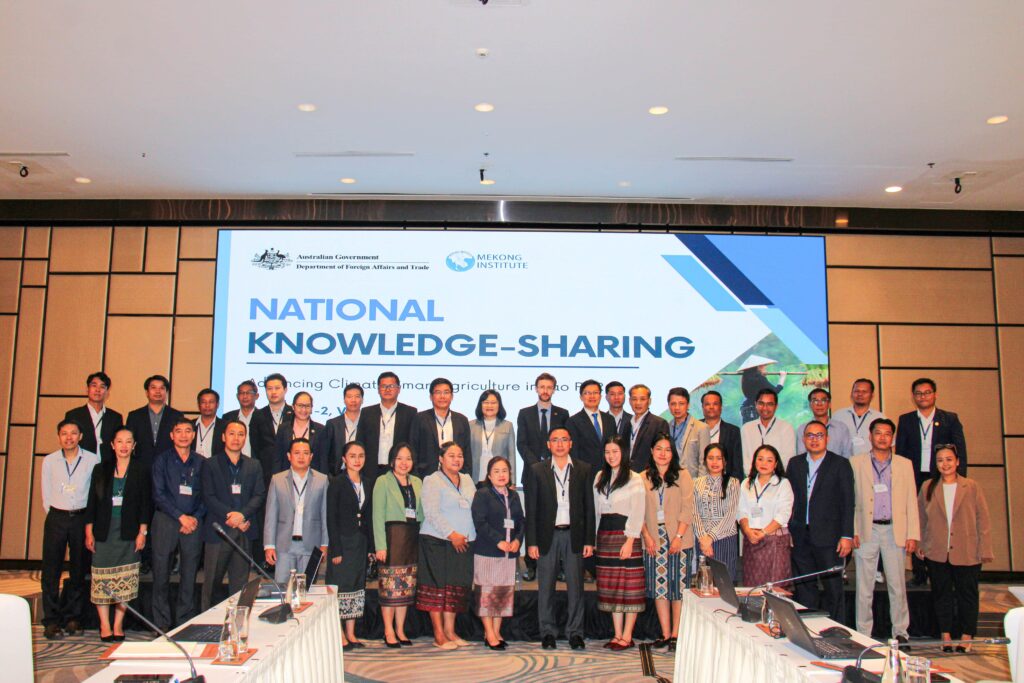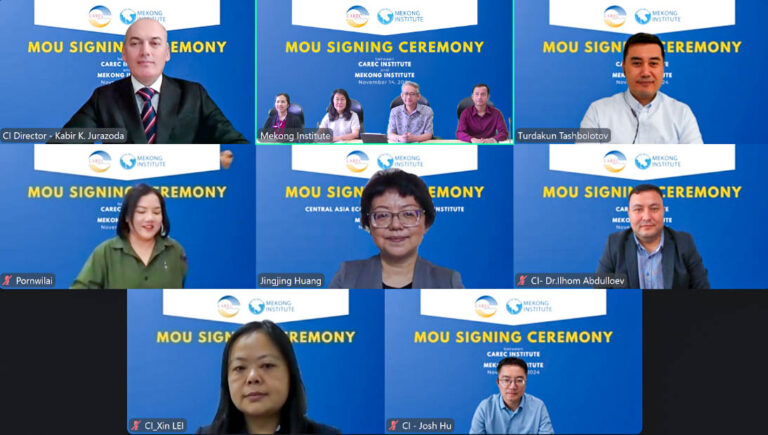Vientiane, October 1-2, 2024 – Lao PDR demonstrated its dedication to advancing Climate-Smart Agriculture (CSA) during a National Knowledge-Sharing Workshop held in Vientiane. The event was organized by the Mekong Institute (MI) in partnership with the Australian Government Department of Foreign Affairs and Trade (DFAT), bringing together 40 stakeholders from government, development agencies, the private sector, and academia to discuss strategies for enhancing agricultural resilience in the face of climate change.
In her welcome remarks, Ms. Maria Theresa S. Medialdia, Director of MI’s Agricultural Development and Commercialization Department, highlighted the workshop’s importance in identifying strategic priorities for CSA in Lao PDR. She reiterated MI’s ongoing commitment to supporting climate-smart solutions that promote sustainable agricultural development and food security throughout the Mekong subregion.
Mr. James Morschel, First Secretary at the Australian Embassy in Lao PDR, delivered opening remarks reaffirming Australia’s commitment to supporting CSA initiatives in Lao PDR and across the Mekong subregion. He addressed shared climate challenges such as severe floods and droughts, and praised the partnership between the MI and Australia in promoting climate-smart agriculture. Mr. Morschel referenced regional training programs and a visit to Queensland, where participants from Lao PDR, Cambodia, Vietnam, and Thailand explored new technologies for efficient farming. He emphasized that CSA not only increases productivity, builds resilience, and reduces emissions, underscoring that climate change is a key pillar of the Lao-Australian Comprehensive Partnership. He concluded with hopes that the workshop would inspire further actions to promote CSA in Lao PDR.
Delivering the keynote address, Dr. Phetkeo Poumanyvong, Deputy Director General of the Department of Planning and Cooperation at the Ministry of Agriculture and Forestry, underscored the urgent need for adopting CSA practices. He noted that the challenges posed by climate change are complex and multifaceted, requiring resilient and adaptable agricultural systems and coordinated efforts across all sectors. “As we face rising temperatures, unpredictable rainfall, and extreme weather events, it is critical that government institutions, development partners, the private sector, and local communities work hand in hand to create an enabling environment for CSA. Policy reforms, strengthened coordination, technology transfer, and improved access to climate finance are essential to advancing these efforts. Together, we can secure food security and protect rural livelihoods,” Dr. Poumanyvong emphasized.
The workshop featured focused discussions on key themes, including policy frameworks for enabling CSA, knowledge sharing and capacity-building, and mobilizing finance for agricultural innovation. Notable speakers included Dr. Phetmanyseng Xangsayasane, Director General of the National Agriculture and Forestry Research Institute (NAFRI); Dr. Linglong Sithixay, Director of the Clean Agriculture Standard Center; Dr. Avakat Phasouysaingam, Faculty of Agriculture, National University of Laos; Mr. Phommachanh Phothichanh, National Monitoring and Evaluation Consultant, FAO Representative in Lao PDR; and Ms. Khonemany Phimvongsa, Director of the Licensing Division, Bank Supervision Department, Bank of Lao PDR. The panelists emphasized the necessity for greater policy alignment, improved inter-agency coordination, and enhanced financial support for smallholder farmers transitioning to climate-smart practices.
A key highlight of the workshop was a presentation by CSA alumna, Ms. Kanyalack Thammavongsa, who led initiatives in southern Lao PDR that implemented solar-powered water pumps and sustainable farming practices. These initiatives have significantly improved water access, increased crop yields, and boosted incomes for women’s cooperatives. By reducing time spent on water collection and providing financial literacy and market development support, the initiative has enhanced both agricultural productivity and economic resilience, while also contributing to climate change mitigation.
As the event concluded, participants reaffirmed their commitment to scaling up CSA practices across Lao PDR. Moving forward, the focus will now shift toward developing a cohesive national CSA action plan that integrates monitoring and reporting systems to ensure effective policy translation into action at both national and sub-national levels. Cross-sector collaboration will be strengthened through partnerships involving government, private sectors, development organizations, youth groups, and farmer networks like the Lao Farmer Network. These collaborations will aim to mobilize resources and facilitate knowledge transfer, particularly to address capacity gaps among key stakeholders such as farmers, extension workers, and government officials. Simplifying the certification process for organic and GAP standards was identified as essential to reducing the financial and administrative burdens on farmers. Additionally, improving access to finance will be critical; efforts will target leveraging green finance options, risk-sharing schemes, and private sector investments through incentives like tax breaks. Strengthening market access for green agricultural products will also be vital for ensuring long-term sustainability and resilience within Lao PDR’s agricultural sector.
The workshop ended with a visit to Pawan Farm, a leading example of smart farming in Lao PDR. Led by Ms. Viengsavanh Khammanivong, CEO of Pawan Farm, the visit showcased practical applications of CSA techniques, including innovative water management and sustainable farming practices. A drone demonstration, led by Dr. Avakat Phasouysaingam, highlighted technology’s role as a tool for precision agriculture within CSA frameworks.








